|
4 November 2022 Australian Grape & Wine recently announced that it has negotiated a temporary change to the Liquor Control Board of Ontario (LCBO) MRL for phosphorous acid. This change means that the LCBO will accept Australian wines produced from vintages leading up to and including the 2023 vintage, provided that:
Exporters should note that the change to the LCBO’s MRL for phosphorous acid is temporary and subject to further review. Also, despite this temporary change, the relevant MRL in Ontario (and other major export markets) remains relatively low, and grapegrowers and winemakers should exercise care if intending to use phosphorous acid this growing season on grapes eventually destined for export. The AWRI continues to recommend that growers engage with their grape purchasers or winery before making decisions on the use of phosphorous acid. More information about phosphorous acid and export markets is available on the phosphorous acid page on the AWRI website and in the ‘Dog book’. For further information on the export of Australian wine to Ontario, consult Wine Australia’s Export Market Guide – Canada or contact exports@wineaustralia.com. For assistance with any technical grapegrowing or winemaking questions, contact the AWRI helpdesk on helpdesk@awri.com.au or 08 8313 6600. |
|
For other enquiries |
The Australian Wine Research Institute Blog
A wet season update – managing downy mildew and fungal diseases
27 October 2022 >27 October 2022
Very wet weather over the spring period has affected many Australian grapegrowing regions. Conditions have been conducive to the development of fungal diseases and symptoms of downy mildew infection of grapevines have been reported. The forecast is for this weather pattern to remain until the end of the year and it is important to take action now to avoid major crop loss. This eBulletin provides a fresh reminder of some strategies that can help reduce the risk and severity of fungal infection in high disease pressure years.
Be prepared to do more than usual
As weather affects when sprays can be applied, this season you should take every opportunity to get a spray on when you can. In wet seasons grapevines grow vigorously and the intervals between sprays must be shortened. A seven-day interval between sprays is sometimes necessary to protect rapidly emerging new growth. This might not be possible for everyone as you may be constrained by factors including restricted block access due to waterlogging, capacity of machinery to cover the vineyard area in a short time and access to chemical control options.
Prevention of disease is better than a cure in the current wet conditions. Planning to delay sprays until after an infection event may be viable for downy mildew in a dry year, but when disease pressure is very high you need to get protectants on early. There is always high demand for fungicides in wet years, so where possible keep a supply of chemicals on-hand. Almost all the registered products for downy mildew are protectants. Do not use these products on an active downy infection as this can lead to resistance, which may result in the loss of the product in the future.
For more information on registered agrochemicals refer to the Dog Book. Ask your supplier about what products are available and their attributes because products vary in their ability to function during extended wet weather periods. It’s important to use the product best suited to the conditions and this may be different from what you would use in dry years.
Communication with your winery or grape purchaser about your circumstances and your plan for controlling disease this season may provide options you had not considered. It will also enable a discussion about chemical options that are restricted for use in the Dog Book. The AWRI website has information about the use of phosphorous acid, but contact your winery or grape purchaser before using this product, because some export markets have a low tolerance to residues.
Tips for best-practice disease control
Good spray coverage is critical and failure to hit the target is the main reason for poor disease control. Test your spray coverage using water sensitive papers. Once your equipment is well set up, ensure you are putting out the right chemical rate and are not underdosing.
If you have had a downy mildew infection event and are using a metalaxyl or metalaxyl-M (group 4) for curative control, then a second group 4 spray on a 7–10-day interval is required. Use of a follow-up option from groups 40, 45, 21, 49 or 11 (assuming sensitivity remains) prior to the next period of infection is warranted to ensure the infection is controlled.
Shoot thinning, bunch thinning, leaf removal and carefully timed trimming may be necessary in a high-vigour year to open the canopy to light and air. This improves canopy drying time after rainfall and assists in spray penetration and chemical deposition in otherwise hard-to-reach areas. Vineyard floor management, such as keeping mid-rows low to support airflow and canopy drying, is another strategy to put in place. In addition, if a neighbour has made the decision to ‘rest’ their block, spraying a few boundary rows of theirs may help reduce disease pressure from those vines.
Be prepared to make tough decisions
When resources and time are constrained, it may be necessary to prioritise blocks. This means identifying your most profitable blocks and focusing on getting a healthy crop off those blocks. Spreading your resources too thinly in a high-pressure year may result in no suitable fruit being produced. If some areas of a block have become dangerous to access due to the conditions, make the decision early to sacrifice that fruit and focus your attention on those areas that can be safely managed.
Don’t forget the other diseases
Downy mildew oil spots will be top of mind for many, but powdery mildew and Botrytis are also a threat to yield and fruit quality. Powdery mildew is a risk when conditions are cloudy and humidity is high and this disease can grow rapidly. The typical week 2, week 4, week 6 spray program is not adequate in seasons like this one and protectants for powdery mildew should go out with all downy sprays. Controlling for downy and powdery will help manage Botrytis, and cultural practices that open up the canopy will be beneficial. Botrytis spore load will be high leading into and throughout flowering periods. If you have a budget for Botrytis sprays, flowering and pre-bunch closure are recognised as the critical growth stages. Removing the trash from inside and around developing bunches post-flowering takes away a source of Botrytis inoculum and alters the bunch environment for improved airflow and bunch drying. This strategy typically involves a harvester or blower, so planning and preparation are necessary.
Availability of metalaxyl and metalaxyl-M products
The metalaxyl and metalaxyl-M products registered for viticulture are currently in short supply. A permit has been sought from the APVMA to allow the use of alternative metalaxyl (-M) products that do not have grapes listed on the label. This process is undertaken in consultation with the agrochemical manufacturers to ensure that the products on the permit are suitable for the proposed use and there is stock available. The permit will detail which products are approved for off-label use and the conditions for their use. One important requirement is that they are tank mixed with a registered downy mildew protectant fungicide. It is anticipated that this permit will be received within the next one to two weeks. Some metalaxyl (-M) products are formulated for soil application and the suppliers of these products do not recommend their use as foliar sprays on wine grapes and they should not be used.
Don’t forget to look after yourself and your mates
These are difficult times and many are finding the going tough. Check on your mates and if you are in a difficult spot, it is important to talk about it. There is help available in your local community and from these organisations: Beyond Blue, Lifeline, Headspace, R U OK?, Black Dog Institute.
Additional resources on fungal diseases
- WA Department of Primary Industries and Regional Development’s information on downy mildew
- AWRI downy mildew update, November 2021
- The AWRI’s resources on downy mildew
- The AWRI’s resources on powdery mildew
- The AWRI’s resources on Botrytis
- Wine Australia’s resources on downy mildew
- Wine Australia’s resources on powdery mildew
- Wine Australia’s resources on Botrytis
- Control strategies for downy mildew and Botrytis (AWRI webinar 9 November 2018)
Acknowledgements
Liz Riley (Vitibit), Kerry DeGaris (Treasury Wine Estates), Warren Birchmore (Accolade Wines), Philip Deverell (Pernod Ricard Winemakers) and Scott Paton (Nutrien Ag Solutions) are thanked for their contributions to this eBulletin.
For more information or assistance, please contact the AWRI helpdesk on
08 8313 6600 or helpdesk@awri.com.au.
Agrochemical update – New active constituent
>|
27 October 2022 FLUOXAPIPROLIN APVMA 89997 ‘Xivana Prime 20 SC’ is a Bayer Crop Science product. ‘Xivana Prime 20 SC’ contains the new active constituent fluoxapiprolin and is registered for control of downy mildew in grapevines. It is an activity group 49 fungicide and is suitable for use as part of a preventative spray program. Recommended restriction on use (withholding period) for grapes destined for export wine: Use no later than E-L 31, berries pea-size (not > 7 mm diameter). Resistance management: It is recommended that ‘Xivana Prime 20 SC’ is applied with another registered downy mildew protectant fungicide from a different mode of action group applied at registered rates for resistance management purposes. For more information, please contact Marcel Essling on 08 8313 6600 or email helpdesk@awri.com.au. This information is provided to inform the Australian grape and wine sector and should not be interpreted as an endorsement of any product. |
Technical Review October 2022 issue available online
>The October 2022 issue of Technical Review is now available online. It’s a bumper issue with more than 140 articles featured.
The new format offers a more convenient and seamless experience. Articles available online are linked directly to publishers’ websites where you can read full-text articles. Australian winemakers and grapegrowers who pay the Wine Grapes or Grape Research levies can log in to read abstracts and order the latest non-open access journal articles from the AWRI Library, free of charge. Register a new login or use the forgotten password link to reset your password.
We welcome your feedback on the new Technical Review and you can reach us at infoservices@awri.com.au.
CloudSpec acquires AWRI WineCloud colour and tannin capability
7 October 2022 >New Zealand spectroscopy company Marama Labs will soon incorporate wine analysis technology invented by the Australian Wine Research Institute (AWRI) into its CloudSpec wine platform.
Back in 2010, the AWRI harnessed state-of-the-art knowledge on tannin chemistry to develop a world-first web-based platform for determining tannin levels in wines. This platform (originally named the Tannin Portal), was subsequently expanded in 2012 to include measurement of tannins in grapes and juice, now known as the WineCloudTM.
The platform has been used by grape and wine producers across the world, to support critical decisions on harvest timing, fermentation and wine blending/classification. The database used by producers to benchmark their processes now houses data for over 65,000 wine samples and 20,000 grape samples.
Marama Labs’ CloudSpec platform is being rapidly adopted in winemaking for its unique ability to measure the style profile of hazy, unfiltered wine samples. Not having to filter samples saves wineries massive amounts of laboratory preparation time and improves the accuracy of colour and phenolic assessments at key stages, such as juice pressing and ferment management.
After a collaboration in 2020, Marama Labs and AWRI identified that CloudSpec’s hazy sampling ability provides significant advantages for wineries to use the WineCloud analysis to guide winemaking decisions.
Marama Labs has secured the rights to the algorithms used to generate the colour, phenolic and tannin data, as well as the extensive grape and wine database. These will be built into Marama Labs CloudSpec platform, which will be able to be accessed by users who wish to continue to use the WineCloud technology and generate this important information for their grapes and wines.
Eric Wilkes, General Manager – Commercial and Regulatory Affairs, AWRI commented on the positive impact this partnership will have for the wine industry. “We are excited for Marama Labs to integrate this technology, developed at AWRI over the past two decades, into the CloudSpec platform. CloudSpec is a unique tool for winemakers to assess wine style and integrating the WineCloud analyses will further help the industry improve quality assessment.”
Marama Labs CEO Brendan Daby says the company is proud to be offering AWRI’s world leading science on its platform. “Wineries are constantly looking for ways to innovate and capitalise on emerging trends, such as evolving consumer preferences and environmental constraints. Combining CloudSpec’s rapid sample analysis with WineCloud’s chemical insights will empower winemakers to build even higher quality products that consumers love, with less time and cost required.”
Details
Marama Labs will be incorporating the WineCloud analysis feature into CloudSpec ready to be rolled out in October 2022 to New Zealand, Australia and the USA. The WineCloud feature will be an additional functionality available on top of CloudSpec’s standard colour and phenolics analysis capabilities. Sample analysis will be performed using a CloudSpec device, and data can be uploaded to CloudSpec’s Insights web app, for data analysis, tracking and visualisation. Clients will require a CloudSpec device and web app login to run the analysis.
AWRI will continue its current WineCloud service until July 2023, during which time clients can transition to the CloudSpec service. Existing WineCloud customers looking to transition to CloudSpec should contact Marama Labs directly. Existing CloudSpec customers will be contacted by Marama Labs to discuss the feature roll-out. For wineries interested in becoming a CloudSpec user, please contact Marama Labs.
For more information, please contact:
Marama Labs: marco.wilkins@maramalabs.com
eNews – October 2022
6 October 2022 >Nominations sought for grapegrower representative on AWRI Board
AWRI Board announces two appointments, including next Chair
More than 1,000 members for Sustainable Winegrowing Australia
New approach to white wine protein stabilisation
New fast and accurate method for detecting Brett in wine
Register to be part of NOLO innovation
Affinity Labs events – coming soon!
Order the latest AWRI publications online
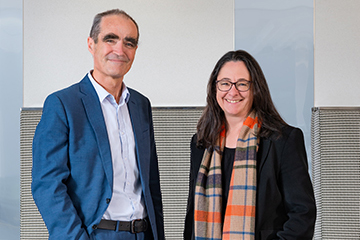
Prof. Kiaran Kirk with current Chair Louisa Rose
Nominations sought for grapegrower representative on AWRI Board |
|
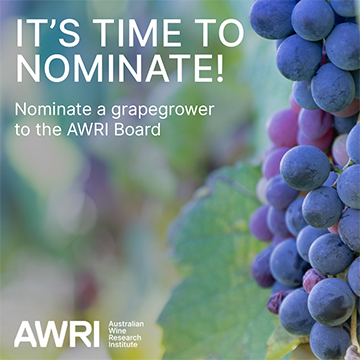 |
Following changes to the AWRI Constitution earlier this year, the AWRI Board now includes for the first time one person who is nominated/elected by grape research levy payers. The AWRI is therefore calling for nominations from grape research levy payers for this position, as well as for a person nominated under the large (>50,000 tonne) wine grape levy payer category.
Nominations are to be received by post to The Returning Officer, The Australian Wine Research Institute Ltd, PO Box 197, Glen Osmond SA 5064 or by email to returningofficer@awri.com.au NO LATER THAN 5 PM FRIDAY 21 October 2022. If more than one nomination is received in each category, an election in that category will be conducted during November 2022. Details and nomination forms are available from the Election and appointment of Directors page on the AWRI website. |
AWRI Board announces two appointments, including next Chair |
|
 Prof. Kiaran Kirk with current Chair Louisa Rose |
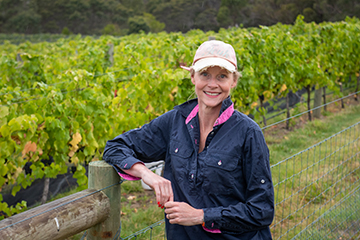 The Hon. Sarah Courtney |
| The AWRI Board recently announced the appointment of two Directors, Prof. Kiaran Kirk and The Hon. Sarah Courtney. These two Directors were appointed through a new process put in place following updates to the AWRI Constitution in 2022. A nominations committee, chaired by former Director Dr John Harvey, conducted a rigorous and independent recruitment process, which recommended Prof. Kirk and Ms Courtney to the Board and that recommendation was accepted at the most recent Board meeting. The Board also resolved that Kiaran would take on the role of Chair from 1 January 2023, following the conclusion of current Chair Louisa Rose’s term on 31 December 2022. Kiaran and Louisa will work closely together between now and the end of the year to ensure a smooth transition. | |
More than 1,000 members for Sustainable Winegrowing AustraliaAfter a busy membership renewal period the Sustainable Winegrowing Australia team has crunched the numbers and is delighted to report some significant membership milestones:
This momentum reflects the strong and growing commitment to sustainability across the Australian grape and wine community. The team is currently reviewing all of the data submitted during the renewal period, with benchmarking reports to be released to members in October. More information about the program is available from sustainablewinegrowing.com.au. |
|
Practices Survey – make sure your data is counted |
|
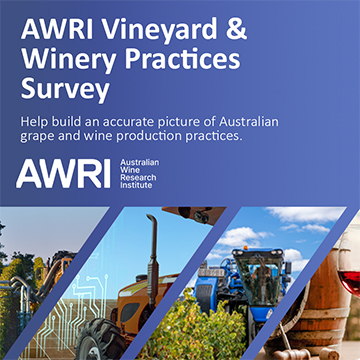 |
The AWRI Vineyard and Winery Practices Survey tracks the practices used in vineyards and wineries across Australia, helping to inform future R&D and extension activities. The survey is repeated at six-yearly intervals to discover how practices and technologies are changing. Your help is needed to ensure the data is representative of Australian grape and wine production. Please visit https://bit.ly/2022-practices-survey now to take part. Thank you for taking the time to contribute. |
New fast and accurate method for detecting Brett in wineAffinity Labs is offering a new flow cytometry-based method known as BrettCount for detecting viable Brettanomyces cells in wine. This method uses a mixture of fluorescent gene probes targeting different regions of the 16s ribosomal RNA of Brettanomyces cells to rapidly detect and quantify them in wine. The method has high specificity and does not cross react with other species that may be present in wine. The limit of detection is 100 cells/mL. Only viable cells are detected, although some cells that are not culturable under laboratory conditions can also be detected. BrettCount is rapid, with results obtained within one day. A recent comparative study showed that BrettCount correlates better with the ‘gold standard’ selective plating method than other rapid methods. For more information or to submit samples for BrettCount analysis, contact customerservice@affinitylabs.com.au. |
|
Register to be part of NOLO innovationWine Australia and the AWRI are seeking expressions of interest from growers, winemakers and wine supply-chain partners for a new no or low alcohol (NOLO) wine research innovation program. Complete your submission at wineaustralia.com/nolo-wine-eoi before Friday 14 October 2022 to help shape the program by outlining your current and projected aims, obstacles and opportunities for NOLO wines. |
|
Affinity Labs events – coming soon!The Affinity Labs team will be on the road soon, visiting regions to meet with customers, discuss the latest services and hear how Affinity Labs can best support growers and winemakers across different areas. Keep an eye on the Affinity Labs event page to find out when the team is visiting your region. |
|
Order the latest AWRI publications onlineAccessing the latest AWRI publications is easy. Visit the AWRI Publications web page to:
The AWRI’s most recent publications are listed below. Dixon, R. Improving the accuracy of yield estimates. Technical Review No. 259 August 2022 2306 Sui, Y., Wollan, D., McRae, J.M., Muhlack, R., Capone, D.L., Godden, P., Wilkinson, K.L. Chemical and sensory profiles of Sauvignon Blanc wine following protein stabilization using a combined ultrafiltration/heat/protease treatment. Front. Nutr. 9: 799809; 2022. 2307 Favell, .JW., Wilkinson, K.L., Zigg, I., Lyons, S.M., Ristic, R., Puglisi, C.J., Wilkes, E., Taylor, R., Kelly, D., Howell, G., McKay, M., Mokwena, L., Plozza, T., Zhang, P., Bui, A., Porter, I., Frederick, O., Karasek, J., Szeto, C., Pan, B.S., Tallman, S., McClure, B.A., Feng, H., Hervé, E., Oberholster, A., Zandberg, W.F., Noestheden, M. Correlating sensory assessment of smoke-tainted wines with inter-laboratory study consensus values for volatile phenols. Molecules. 27(15): 4892; 2022. 2308 Essling, M. Ask the AWRI: Factors involved in ‘mothballing’ vineyards. Aust. N.Z. Grapegrower Winemaker (703): 69-70; 2022. 2309 Grebneva, Y., Bilogrevix, E., Rauhut, D., Herderich, M., Hixon, J.L. Impacts of photoselective bunch zone shading on the volatile composition and sensory attributes for Vitis vinifera L. cv. Riesling. OENO one 56(3): 313-326; 2022. 2310 Coulter, A. Ask the AWRI: Stinky sulfur compounds in wine. Aust. N.Z. Grapegrower Winemaker (704): 85-86; 2022. 2311 Gonzaga, L.S., Danner, L., Bindon, K., Gledhill, J., James, A., Collins, C., Bonada, M., Petrie, P., Bastian, S. Revealing the Barossa zone sub-divisions through sensory and chemical analysis of Shiraz wine. iVES Conference Series. Proceedings of the 2nd ClimWine Symposium, July 3-8, 2022. https://ives-openscience.eu/13228/: 1-5; 2022. 2312 Cordingley, B., Coulter, A., Cowey, G., Dixon, R., Essling, M., Holdstock, M., Longbottom, M., Penfold, C., Pitcher, L., Schwarz, C., Simos, C., Krstic, M. Vintage 2022 – observations from the AWRI helpdesk. Wine Vitic. J. 37(4): 36-38; 2022. 2313 Corsi, A.M., Dolan, R., Goodman, S., Pearson, W. Exploring the attitudes and expectations of Australian drinkers and non-drinkers towards low and no-alcohol wines. Wine Vitic. J. 37(4): 70-72; 2022. 2314 Dry, P., Smart, R. Varietal choice for a warmer future. Wine Vitic. J. 37(4): 54-61; 2022. 2315 Dry, P. Pecorino. Wine Vitic. J. 37(4): p. 67; 2022. 2316 Ismail, I., McKay, S., Van Den Heuvel, S., Borneman, A., Sosnowski, M. Evaluation of spore collection methods for detection and quantification of fungicide resistance in powdery mildew. Wine Vitic. J. 37(4): 46-52; 2022. 2317 Nordestgaard, S. History and recent developments in under-vine weeding equipment. Aust. N.Z. Grapegrower Winemaker (705): 50-61; 2022. 2318 Schwarz, C. Ask the AWRI: How’s the weather? Aust. N.Z. Grapegrower Winemaker (705): 50-61; 2022. |
|
AcknowledgementsThe AWRI acknowledges support from Australia’s grapegrowers and winemakers through their investment body, Wine Australia, with matching funds from the Australian Government. The AWRI is a member of the Wine Innovation Cluster in Adelaide, South Australia. |
|
Technical Review August 2022 issue available online
25 August 2022 >The new format offers a more convenient and seamless experience. Open access articles are linked to publishers’ websites where you can read full-text articles. Australian winemakers and grapegrowers who pay the Wine Grapes or Grape Research levies can log in to read abstracts and order the latest non-open access journal articles from the AWRI Library, free of charge. If you have forgotten your password for the AWRI website, please use the forgotten password link to reset your password.
We welcome your feedback on the new Technical Review and you can reach us at infoservices@awri.com.au.
Registrations are open for the next five webinars in our 2022 series
>As we turn the corner out of winter and head into September, registrations are now open for the next five webinars of the AWRI webinar program. Starting on Thursday, 1 September, the AWRI’s Mark Solomon will discuss using foliar sprays containing sulfur and nitrogen to boost tropical characters in white wine. Other webinar topics in this September block include soil health and soil water holding capacity, grapevine trunk disease, weather forecasting tools and the sensory impact of amino acids in dry red wine.
There will be an opportunity for audience members to ask questions.
Sessions are held on Thursdays at 11:30 am (SA time).
All webinars are free to attend but do require pre-registration.
The five upcoming webinars are:
1 September 2022: Influencing tropical thiol concentration in white wine by combining foliar sprays and yeast selection – Mark Solomon (The Australian Wine Research Institute)
8 September 2022: Soil health and soil water holding capacity – Chiara Pasut (CSIRO) and Jeremy Nelson (Murray Lands and Riverland Landscapes Board)
15 September 2022: Grapevine trunk disease management for vineyard longevity – Dr Reggie Billones Baaijens (Charles Sturt University) and Dr Mark Sosnowski (SARDI)
22 September 2022: New BoM forecast products to help manage a La Niña summer – Peter Hayman (SARDI)
29 September 2022: The influence of amino acids, and their interactions, on the sensory properties and consumer acceptance of dry red wine – Damian Espinase Nandorfy (The Australian Wine Research Institute)
See the full program here.
System requirements
You will need a computer or mobile device with an internet connection. Audio is connected over the internet using your computer or mobile device’s speakers (voice over internet protocol – VOIP). Participants joining a webinar via a mobile device will need to download a free app available from iTunes or Google Play.
If you’ve missed a previous AWRI webinar, you can watch online via the AWRI’s YouTube channel.
For further information on AWRI webinars, please contact the AWRI events team.
New-to-nature yeast chromosome could be game changer for industry
8 August 2022 >eNews – July 2022
29 July 2022 >New understanding of the importance of proline in dry red wine
Update on AWRI Board appointments
Sustainable Winegrowing Australia news
New approach to white wine protein stabilisation
Have you tuned into Season 2 of AWRI decanted?
Order the latest staff publications online
New understanding of the importance of proline in dry red wine |
|
 |
New research highlighting the influence of proline on the sensory properties of red wine has just been published by the AWRI and collaborators from Deakin University in the Australian Journal of Grape and Wine Research. Proline is the most abundant amino acid in wine and is used a non-carbohydrate sweetener with viscous properties in other foods. A series of experiments was conducted where proline (plus tannins and volatiles) was added to a red wine low in amino acids and to model wines to assess their sensory effects. The key findings were that proline:
The results suggest that proline has a stronger influence on the sensory properties of red wine than previously suspected. The concentration of proline in grapes is related to ripeness and it cannot be utilised by yeast; as such, its concentration can be manipulated through viticultural practices. Proline is easily measured in wine and could be used to target desirable sensory profiles. Analysis of proline in wine is available from Affinity Labs. To find out more, access the full article here or read AWITC poster 87 here. |
Update on AWRI Board appointmentsApplications for the two appointed Director positions on the AWRI Board closed on 20 July. The Nominations Committee is pleased with the number and calibre of applications received and will be interviewing shortlisted applicants in August. An announcement of the successful appointees is expected to be made following the AWRI Board meeting on 20 September and the new appointed Directors will take office in November 2022. Nominations for vacant elected Director positions will open in September 2022, with more details to be provided closer to that date. For more information on any aspect of the AWRI’s Board election and appointment processes, contact AWRI Company Secretary, Shiralee Dodd, on shiralee.dodd@awri.com.au. |
|
Sustainable Winegrowing Australia news |
|
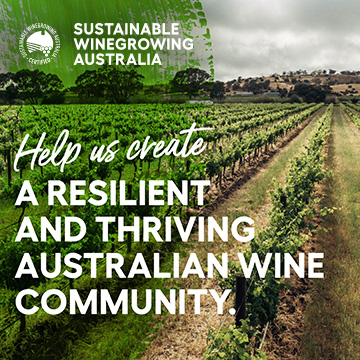 |
It’s a busy time of the year for the Sustainable Winegrowing Australia team, with membership renewals well underway and the new membership season for 2022/23 now open! For existing members, you will notice a number of enhancements to the workbook – including the ability to add your own notes at every question and upload and store multiple documents as you go. This means everything you need will be safely stored in one place and ready to go if you are taking part in an audit.
If you’ve been considering membership, now is a great time to sign up. You can join directly here or if you’d like some extra support, sign up to receive handy tips with all you need to know to get started. And to hear all the latest program news, register now for the webinar coming up on 11 August, presented by Anna Hooper (Australian Grape & Wine), Rachel Triggs and Drea Hall (Wine Australia) and Dr Mardi Longbottom (AWRI). You can also find out about upcoming certification workshops that are being conducted both online and in-person over the next few months. |
New approach to white wine protein stabilisationA collaborative study looking at alternative approaches to protein stabilisation of white wine by researchers from the University of Adelaide and the AWRI has recently been published in the journal Frontiers in Nutrition. The paper reports chemical and sensory evaluation of ultrafiltration in combination with other treatments to achieve protein stabilisation of a Sauvignon Blanc wine. A combined ultrafiltration/heat/protease treatment removed 59% of protein from the wine, reducing the amount of bentonite needed by 72%, without affecting wine quality or sensory characteristics. The full paper is available open access from: https://www.frontiersin.org/articles/10.3389/fnut.2022.799809/full |
|
Have you tuned into Season 2 of AWRI decanted? |
|
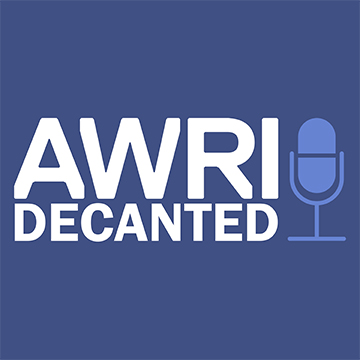 |
The second season of our podcast AWRI decanted is now well underway! New episodes covering irrigation and non-chemical weed control have already been released, featuring both researchers and practitioners. The easiest way to listen is to subscribe to AWRI decanted in your favourite podcast app – that way you will never miss an episode. Alternatively, you can listen directly from the podcast page on the AWRI website. Upcoming episodes cover topics including soil carbon, regenerative viticulture and automation in vineyards. |
Winter and spring webinarsWinter and spring are peak webinar season! Our 2022 webinars kicked off on 21 July with a session on global wine market trends. New webinars are happening every Thursday, with topics including the National Vintage Report, grapevine viruses, sustainability and recovery from hail coming up over the next few weeks. Visit the AWRI webinar page to register for sessions you are interested in, subscribe to the webinar mailing list to be notified as new webinars become available or visit the AWRI’s YouTube channel to view previous webinar recordings at a time that suits you. |
|
Order the latest staff publications onlineAccessing the latest AWRI publications is easy. Visit the AWRI Publications web page to:
The AWRI’s most recent publications are listed below. 2294 Cowey, G. Ask the AWRI: Effects of COVID-19 on sense of smell. Aust. N.Z. Grapegrower Winemaker (700): 48-50; 2022. 2295 Varela, C., Borneman, A. Molecular approaches to improving our understanding of Brettanomyces physiology. FEMS Yeast Res. foac028: 2022. 2296 Varela, C., Kutyna, D., Curtin, C., Borneman, A. KU80 deletion does not improve homologous recombination in Brettanomyces bruxellensis. Authorea DOI: 10.22541/au.165048566.64316743 v1: 1-14; 2022. 2297 Longbottom, M. Ask the AWRI: Importing new grape varieties. Aust. N.Z. Grapegrower Winemaker (701): 78, 80; 2022. 2298 Dabare, P.R.L., Bachhuka, A., Palms, D., Parkinson-Lawrence, E., Hayball, J.D., Mierczynska, A., Vasilev, K. Surface chemistry mediated albumin adsorption, conformational changes and influence on innate immune responses. Appl. Surf. Sci. 596: 153518; 2022. 2299 Kutyna, D.R., Onetto, C.A., Williams, T.C., Goold, H.D., Paulsen, I.T., Pretorius, I.S., Johnson, D.L. Borneman, A.R. Construction of a synthetic Saccharamyces cerevisiae pan-genome neo-chromosome. Nat. Commun. 13: 3628; 2022. 2300 Gawel, R., Schulkin, A., Espinase Nandorfy, D., Milton, P., Bindon, K. Smith, P.A. Float or sink? Comparing the impacts of flotation and cold settling on the non-volatile composition, taste and mouthfeel of white wines. Wine Vitic. J. 37(3): 16-21; 2022. 2301 Longbottom, M., Robinson, E., Krstic, M. Growing shoots of sustainability. Wine Vitic. J. 37(3): 30-33; 2022. 2302 Dry, P. Alicante Bouschet. Wine Vitic. J. 37(3): p. 63; 2022 2303 Villarreal, P., Villarroel, C.A., O’Donnell, S., Agier, N., Quintero-Galvis, J.F., Pena, T.A., Nespolo, R.F., Fischer, G., Verela, C., Cubillos, F.A. Late Pleistocene-dated divergence between South Hemisphere populations of the non-conventional yeast L. cidri. Environ Microbiol. 1-15. doi: 10.1111/1462-2920.16103 ; 2022. 2304 Wilkes, E., Krstic, M. Introducing Affinity Labs – a new identity for the AWRI’s commercial activities. Aust. N.Z. Grapegrower Winemaker (702): 14; 2022. 2305 Cordingley, B. Ask the AWRI: Techniques to detect Brettanomyces before it’s too late. Aust. N.Z. Grapegrower Winemaker (702): 70-71; 2022. |
|
AcknowledgementsThe AWRI acknowledges support from Australia’s grapegrowers and winemakers through their investment body, Wine Australia, with matching funds from the Australian Government. The AWRI is a member of the Wine Innovation Cluster in Adelaide, South Australia. |
|


